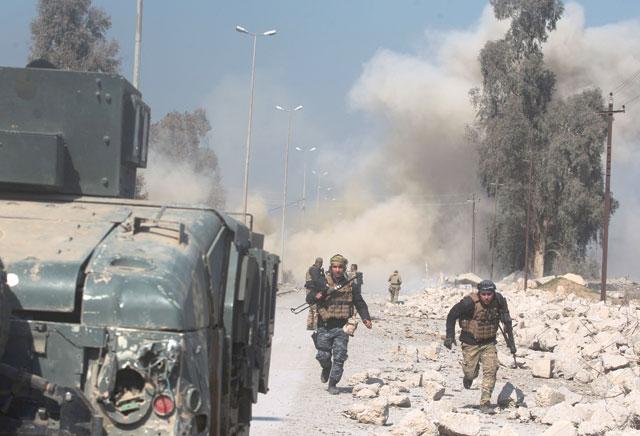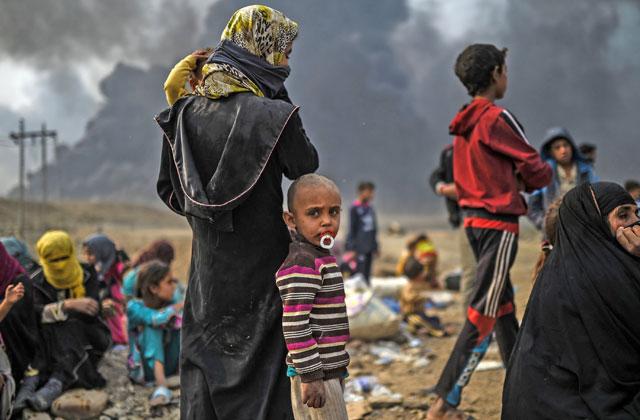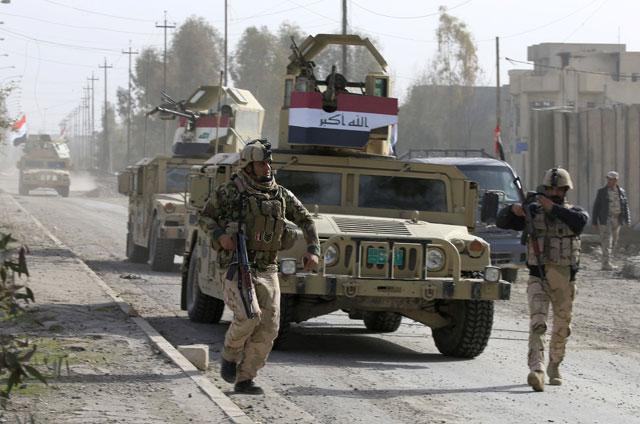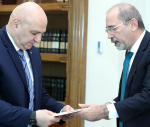You are here
Coalition destroys Mosul bridge to isolate extremists
By AFP - Nov 22,2016 - Last updated at Nov 22,2016
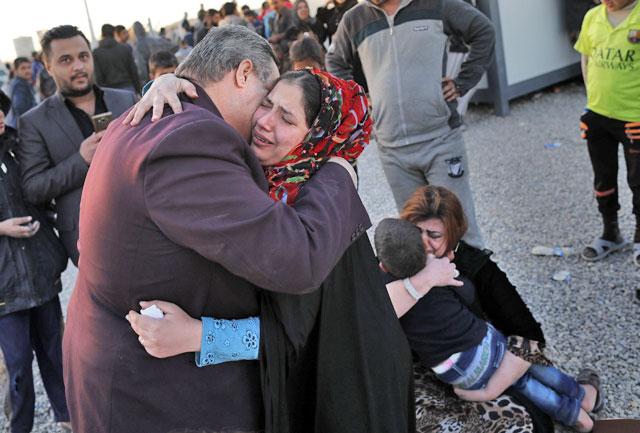
Iraqis, who were separated by the ongoing fighting, cry and hug their relatives as they meet after a long time, at the Khazir refugee camp near the Kurdish checkpoint of Aski Kalak, 40km west of Erbil, the capital of the autonomous Kurdish region of northern Iraq on Monday (AFP photo)
MOSUL — The US-led coalition bombed a key bridge in Mosul Tuesday to isolate extremists whose stiff resistance in the east of the city is threatening to bog down Iraqi forces.
The number of civilians displaced since last month's start of the offensive against Mosul — the Daesh terror group's last stronghold in Iraq — rose to 68,000, but most of the city's population remained trapped.
A coalition aircraft carried out an air strike on Mosul's "third bridge", leaving a British-era bridge in the centre as the last crossing of the Tigris River running through the city.
Coalition spokesman Colonel John Dorrian said Daesh militants have been using the bridges to re-supply the eastern side of the city, "essentially rotating their forces".
“We’re not going to let that happen,” he told AFP.
A member of the provincial council for Nineveh, of which Mosul is the capital, said the central bridge was the last remaining after four others over the Tigris had been destroyed.
Daesh has put up fierce resistance to defend Mosul, the city where its leader Abu Bakr Al Baghdadi proclaimed a “caliphate” in June 2014.
The eastern bank of the Tigris was expected to offer less resistance when tens of thousands of Iraqi forces launched the offensive on October 17 to retake the city.
Trapped civilians
Most of the extremists’ traditional bastions are on the western side of Mosul, as is the old city whose narrow streets will be hard to penetrate for the government forces’ armoured vehicles.
A spokesman for the International Organisation for Migration voiced concern that the lack of bridges could further trap civilians, who Daesh have routinely used as human shields.
“That would deprive a lot of families with an avenue to get away from the fighting,” Joel Millman told AFP.
Over five weeks, Iraqi forces advancing on several fronts have made considerable progress in the advance, but the fighting in Mosul itself has been tough.
Elite forces from the Counter-Terrorism Service (CTS) — the best trained units in the country — have faced a daily barrage of mortar and sniper fire.
Daesh militants have also launched car bombs driven by a seemingly endless supply of suicide bombers against their positions and convoys in the city.
“We’re just in the very toughest part of the fight,” Dorrian said.
Iraqi forces are “up against an enemy where the most likely course of action and the most dangerous course of action are often one and the same,” the coalition spokesman said.
The intensity of the fighting has made it difficult for the hundreds of thousands of civilians in Mosul to flee to safety in camps erected around the city.
No safe routes
“68,550 people are currently displaced and in need of humanitarian assistance,” the United Nations’ Office for the Coordination (OCHA) of Humanitarian Affairs said Tuesday.
OCHA said the aid response to the offensive was growing in complexity, with varying needs for different categories of civilians.
“Humanitarian needs are severe among displaced families in and out of camps, vulnerable residents of retaken communities, and people fleeing the intense fighting in Mosul city,” it said.
The UN had initially predicted that 200,000 civilians could be forced from their homes in the first few weeks of the offensive, Iraq’s biggest military operation in years.
Iraqi forces have so far been sending the message to the population of Mosul that they should stay at home and not try to flee through the front lines.
Many residents of Mosul have indeed hunkered down homes as Iraqi forces took on Daesh militants in fierce street battles.
That has restricted both the government forces’ ability to use heavier weaponry against the extremists and aid groups’ ability to deliver assistance to civilians in need.
“While Mosul is under ongoing heavy attack, there are currently no safe routes out of the city,” Norwegian Refugee Council Spokeswoman Becky Bakr Abdulla told AFP.
“Civilians are facing an extremely difficult decision of either staying in their homes stuck in the crossfire or risk their lives in an attempt to find their way out of the city,” she said.
Related Articles
MOSUL AIRPORT, Iraq — Iraqi forces on Thursday thrust into Mosul airport on the southern edge of the extremist stronghold for the firs
QARAQOSH, Iraq — Iraqi forces advancing on Mosul faced stiff resistance Monday from the Daesh terror group despite an unprecedented wave of
ERBIL /BAGHDAD — Iraqi forces pushed Daesh militants back further in Mosul on Tuesday in a renewed effort to seize the northern city and dea


